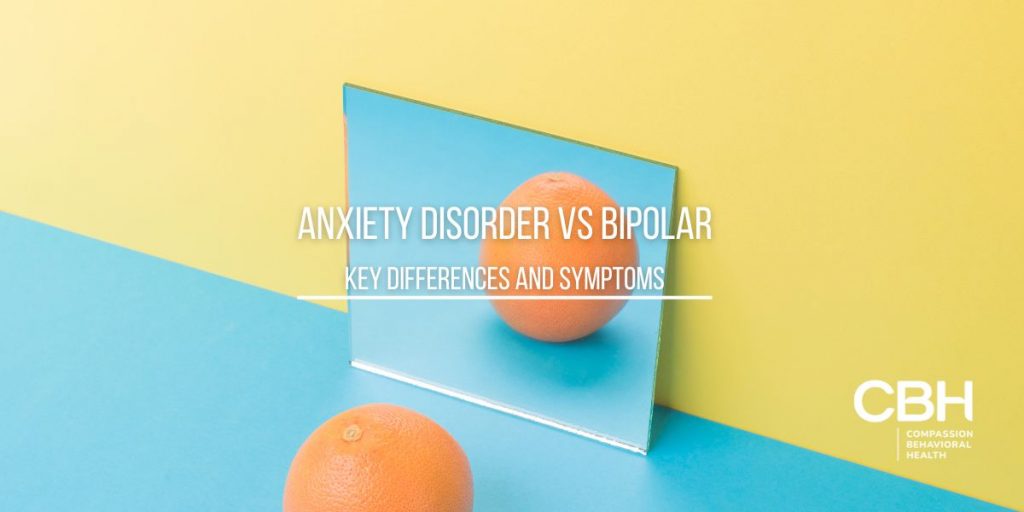Understanding mental health is crucial in today’s world, as it impacts our overall well-being and day-to-day functionality. This article delves into the key differences between anxiety disorder and bipolar disorder, highlighting their symptoms, effects on life, and coping strategies. One of the key differences between anxiety disorder and bipolar is that the diagnostic criteria for anxiety disorder focus on persistent excessive worry and fear, while distinct mood episodes, including manic, hypomanic, and depressive phases characterize bipolar disorder.
Whether you or a loved one is experiencing these issues, awareness and knowledge are vital for managing mental health effectively.
Understanding Mental Health: An Overview
Mental health encompasses emotional, psychological, and social well-being. It affects how we think, feel, and act, influencing our decision-making, stress management, and relationships. Unfortunately, stigma and misinformation still surround mental health, often leading to misunderstandings and neglect. The complexities of mental health can vary widely from one individual to another, making it crucial to approach the topic with sensitivity and an open mind. Factors such as genetics, environment, and life experiences play significant roles in shaping one’s mental health, highlighting the need for a comprehensive understanding of these influences.
Increasing mental health awareness contributes significantly to societal acceptance and helps individuals seek necessary help without fear of judgment. Understanding the nuances of various mental health conditions like anxiety disorder and bipolar disorder can empower both sufferers and their communities. Furthermore, education about mental health can bridge gaps in knowledge, allowing for more informed conversations and reducing the prevalence of harmful stereotypes. As we foster a culture of understanding, we create spaces where individuals feel safe to share their experiences and seek support.
The Importance of Mental Health Awareness
Cognizance of mental health is essential for several reasons:
- It encourages open discussions about mental health issues.
- It aids individuals in recognizing symptoms in themselves and others.
- It reduces stigma, fostering a more supportive environment.
- It promotes early intervention and effective treatment.
When individuals are aware of mental health challenges and their consequences, they are better equipped to support themselves and those around them. Moreover, mental health awareness can lead to improved workplace environments, as employers who prioritize mental well-being often see increased productivity and employee satisfaction. By implementing mental health programs and resources, organizations can create a culture that values psychological safety, ultimately benefiting both the workforce and the overall success of the business.
Defining Anxiety Disorder
Anxiety disorder is characterized by excessive fear or worry that interferes with one’s daily activities. It can manifest in various forms, including generalized anxiety disorder, panic disorder, and social anxiety disorder. The feelings associated with anxiety can be overwhelming, leading to avoidance behaviors and physical symptoms. These disorders can arise from a complex interplay of genetic, environmental, and psychological factors, making them unique to each individual. Furthermore, the onset of anxiety disorders can occur at any age, often beginning in childhood or adolescence, but they can also develop later in life due to stressors or traumatic events.

Common Symptoms of Anxiety Disorder
Anxiety disorders often present with a range of symptoms that can significantly affect individuals. Common signs include:
- Persistent worry or fear about various aspects of life
- Restlessness or feeling on edge
- Fatigue or difficulty concentrating
- Physical symptoms such as increased heart rate, sweating, or trembling
- Avoidance of certain situations or places due to anxiety
These symptoms can be distressing and debilitating, leading to significant life impairment if left untreated. In addition to these common symptoms, individuals may also experience sleep disturbances, irritability, and a sense of impending doom. The cumulative effect of these symptoms can create a cycle of anxiety, where the fear of experiencing anxiety itself leads to further avoidance and isolation, exacerbating the condition over time.
The Impact of Anxiety Disorder on Daily Life
Anxiety disorders not only affect the individual’s mental state but also have far-reaching impacts on several aspects of life:
- Work Performance: Difficulty concentrating can lead to decreased productivity.
- Relationships: Anxiety can cause misunderstandings and strain among friends and family.
- Social Life: Individuals may withdraw from social engagements, fearing judgment or feelings of inadequacy.
Understanding these impacts underscores the importance of addressing anxiety disorders promptly and effectively. Moreover, the financial implications can be significant, as individuals may miss work or require therapy and medication, leading to increased healthcare costs. The emotional toll on loved ones can also be profound, as family members often feel helpless and frustrated when trying to support someone struggling with anxiety. This creates a ripple effect, highlighting the necessity for comprehensive treatment approaches that not only focus on the individual but also involve their support network.
Unpacking Bipolar Disorder
Bipolar disorder is a mental health condition marked by extreme emotional highs and lows. These episodes can include manic phases, where individuals may feel excessively energetic, and depressive phases, characterized by deep sadness and lethargy. The unpredictability of these mood swings can make it challenging for individuals to maintain a consistent lifestyle. During manic episodes, individuals might engage in risky behaviors, such as spending sprees or reckless driving, often without considering the consequences. Conversely, during depressive episodes, even simple tasks can feel insurmountable, leading to isolation and withdrawal from social interactions. This cycle can create a profound impact on one’s daily functioning and overall quality of life.

Recognizing the Signs of Bipolar Disorder
Identifying bipolar disorder involves recognizing patterns of mood changes, which may include:
- Manic episodes marked by exuberant energy, euphoria, and impulsive behavior
- Hypomanic episodes that are less severe but still present elevated moods
- Depressive episodes that bring feelings of sadness, hopelessness, and fatigue
A comprehensive understanding of these symptoms is crucial for early diagnosis and intervention. It is also important to note that bipolar disorder can manifest differently in each individual, making personalized assessment essential. Some may experience rapid cycling, where mood shifts occur frequently, while others may have long periods of stability between episodes. Keeping a mood diary can be a helpful tool for individuals and their healthcare providers to track these fluctuations and identify triggers, ultimately leading to more effective management strategies.
How Bipolar Disorder Affects Relationships and Work
The fluctuating moods associated with bipolar disorder can significantly affect personal and professional relationships:
- Relationships: Partners and family members may struggle to cope with the changes in mood and behavior, leading to tension.
- Workplace Challenges: Consistent productivity can be difficult during manic or depressive episodes, potentially jeopardizing job security.
Effective communication about the disorder can help establish a support network, enabling loved ones to understand the challenges faced by those with bipolar disorder. Furthermore, educational resources and support groups can provide valuable insights for both individuals with bipolar disorder and their families. These platforms foster understanding and empathy, allowing for healthier interactions and reducing the stigma often associated with mental health issues. In the workplace, implementing flexible work arrangements or seeking accommodations can also play a crucial role in helping individuals manage their condition while maintaining their professional responsibilities.
Key Differences Between Anxiety and Bipolar Disorder
While both anxiety and bipolar disorders can significantly affect mental health, understanding their distinctive characteristics is critical for accurate diagnosis and treatment. Each disorder presents unique challenges that can impact daily functioning, relationships, and overall quality of life, making awareness and education crucial for both individuals and caregivers.

Diagnostic Criteria for Anxiety and Bipolar Disorder
The diagnostic criteria for these disorders differ in various aspects:
- Anxiety disorder is primarily centered around persistent excessive worry and fear mechanisms.
- Bipolar disorder is defined by specific mood episodes (manic, hypomanic, and depressive) that occur at different intervals.
These distinctions are vital for mental health professionals in providing appropriate care. For instance, individuals with anxiety disorders may experience symptoms such as restlessness, fatigue, and difficulty concentrating, which can lead to avoidance behaviors that further exacerbate their condition. In contrast, those with bipolar disorder may undergo dramatic shifts in mood, energy, and activity levels, which can lead to impulsive decision-making during manic phases and profound sadness during depressive episodes. Recognizing these patterns is essential for effective intervention.
Treatment Options for Each Disorder
Treatment approaches for anxiety and bipolar disorder can vary:
- Anxiety Disorder: Often treated with therapy (such as cognitive-behavioral therapy) and medications (like SSRIs).
- Bipolar Disorder: Management typically involves mood stabilizers and antipsychotic medications, along with therapy.
Consulting a mental health professional is essential for determining the best course of action for each situation. Additionally, lifestyle modifications, such as regular exercise, a balanced diet, and mindfulness practices, can play a significant role in managing symptoms for both disorders. Support groups and educational resources can also provide individuals and families with valuable tools and a sense of community, helping to reduce feelings of isolation and promote understanding of these complex conditions. The journey towards mental wellness is often multifaceted, requiring a combination of medical, therapeutic, and personal strategies tailored to the individual’s needs.
Coping Strategies for Anxiety and Bipolar Disorder
Managing mental health conditions can feel overwhelming, but adopting coping strategies can significantly improve quality of life.
Self-Care Tips for Managing Symptoms
Individuals can incorporate various self-care practices to help manage their symptoms, including:
- Regular exercise to improve mood and reduce anxiety.
- Mindfulness and meditation to promote relaxation.
- Establishing a routine that encourages stability and predictability.
- Journaling to express thoughts and track mood changes.
These practices can empower individuals, providing tools to navigate difficult days more effectively.

Seeking Professional Help: Therapists and Psychiatrists
Professional assistance can play a crucial role in managing mental health disorders. Engaging with therapists and psychiatrists can provide:
- Access to evidence-based treatment plans tailored to individual needs.
- Regular monitoring of symptoms and medication effectiveness.
- A supportive environment to discuss feelings and experiences.
Reaching out for help is a vital step towards healing and recovery.
The Role of Support Systems in Mental Health
Strong support systems can be invaluable for individuals dealing with mental health challenges. The encouragement and understanding of loved ones can make a profound difference in recovery.
How Family and Friends Can Help
Family and friends can support individuals with anxiety or bipolar disorder by:
- Being present and actively listening without judgment.
- Encouraging participation in treatment and self-care activities.
- Educating themselves about the disorders to understand what their loved one is experiencing.
A supportive network fosters resilience and can significantly enhance coping mechanisms.
The Importance of Community in Mental Health Recovery
A broader sense of community can further strengthen recovery. Community support can take various forms:
- Support groups where individuals share experiences and coping strategies.
- Online forums providing resources and advice.
- Community programs focusing on mental health awareness and education.
Connecting with others who have shared experiences can provide a sense of belonging and reduce feelings of isolation.
In conclusion, understanding the differences between anxiety disorder and bipolar disorder is essential for recognizing their unique symptoms and impacts. Engaging in self-care, seeking professional help, and relying on support systems can significantly contribute to managing these conditions effectively. Awareness and education foster a supportive environment where individuals can thrive and work towards recovery.
Anxiety Disorder and Bipolar Treatment at Compassion Behavioral Health in Florida

If you’re feeling overwhelmed by the challenges of anxiety disorder or bipolar disorder, remember that you don’t have to face them alone. Compassion Behavioral Health is here to offer you a ray of hope and personalized treatment options. Our expert team in South Florida is committed to fostering sustainable recovery through our tailored programs. Whether you’re seeking mental health treatment or substance use treatment, we’re ready to help you achieve your highest physical and mental well-being. Call Us Today and take the first step towards taking back control of your life.



